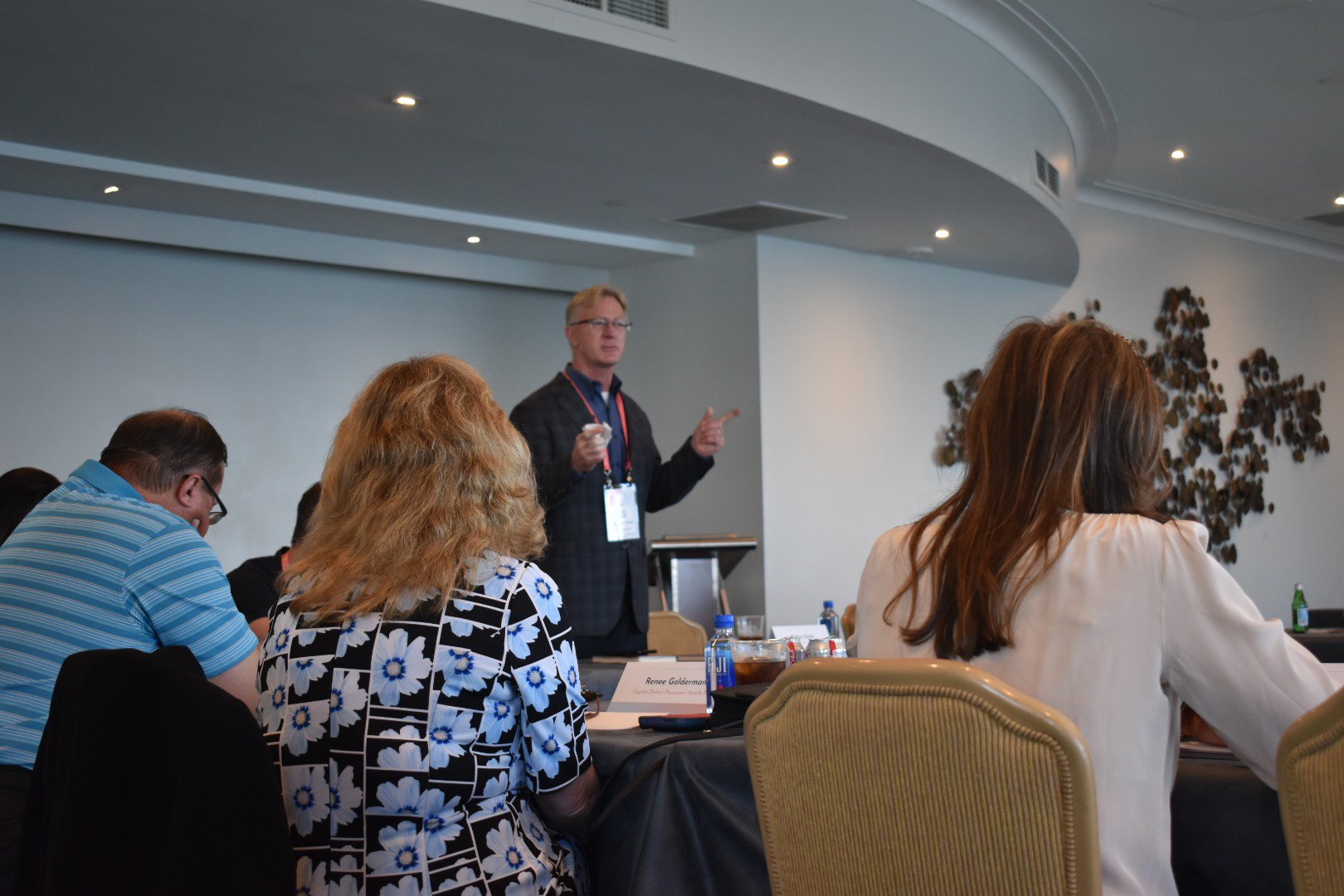The Branding Blog for Healthcare Leaders
Your hub for healthcare branding insights.
Explore our blog for expert insights, tips, and thought leadership in healthcare branding.
Want to see your article here?
Final boarding call: A look at healthcare and the airline industry
There I sat in a hard plastic chair, waiting. Waiting for it to be our turn. After two cancellations, a gate change, and now another delay, it is time to get home. I eagerly, but with somewhat decreasing optimism, wait for the latest update. Again, I check my phone again to see what emails or texts have come through since I last checked it. Searching for a Wi-Fi connection fast enough to talk to my workplace and let them know it might be a little while longer. I reflect that this is why we must continually communicate in our hospitals and clinics.
A View from Overseas - Part 2
The miracle of an outstanding leader. Most say they can count them on the fingers of one hand. It is the one or two good leaders who have really impacted our careers and life in a positive manner. Leaders who actually cared about us as individuals. The leader who personally took the time for us or set us up for success, not just for their own personal advantage.
A View from Overseas - Part 1
By Rodney D. Reider
I have been in multiple clinics, hospitals, and healthcare sites and facilities around the world. I have watched heroic activity by some of the most excellent human beings one can ever come across in this life.
Leadership Potential – Grabbing the Next Rung
By Rodney D. Reider
Such potential! It is very complimentary for our organization to have such a well-respected individual express an interest in leadership. An individual who demonstrates outstanding clinical skills and has the expressed desire to move into a more formal leadership position. This particularly naturally talented individual always comes across as likeable and intelligent.
Innovation spotlight: Life-changing products emerge out of necessity during the pandemic and make life better
By Rodney D. Reider
As we all know, challenges and obstacles provide the opportunity for growth. Many of us are aware of this adage, but some individuals and organizations respond differently to a difficult situation than others. The high performing organizations continue their move in striving to better meet the needs of their patients and customers.
Quintus Curtius' Thirty-Seven
By Rodney D. Reider
“The mind is not a vessel to be filled, but a fire to be kindled.”
-Plutarch
Innovation – People (Part II)
By Rodney D. Reider
You know, a true joy as a leader is when everything goes just right. You receive feedback from the Board supporting your proposal. A new cardiac surgeon signed the contract, the two-year long vacancy is over, the physician will start in September and the heart team is excited. The Press Ganey scores just received show an incredibly positive trend worthy of festivity, and you celebrate, gladly, throughout the facility!
Review of Loserthink by Scott Adams
By Rodney D. Reider
A book about improvement. Another self-help book? One by Scott Adams? Isn’t he the Dilbert guy? It is a good read. I have consumed many self-help books over the years. In fact, I have found many things worth incorporating to improve efficiency, assist in public speaking, or even enhance team-building with the result of positive outcomes through a different or even more purposeful approach. The books always added to my outlook or arsenal, but Mr. Adams discusses thinking itself. He believes and expounds upon a very enlightening and yet simplistic approach; our need for learning to think better and our internal unwarranted confidence in the outcomes of our own thought process and decision-making.
Innovation – People: The Seasons of Life
By Rodney D. Reider
As we know, healthcare leaders have challenging careers. We are constantly navigating the changing healthcare landscape amidst staffing pressures, quality and safety excellence expectations, financial demands, (pandemics), updates on the latest technology all the while continually attempting to avoid the ever-present political pitfalls. We are not just setting goals for the organization; we are in an evolving and advanced environment of constant re-prioritizing.
What are the key components driving innovation?
By Rodney D. Reider
Over the next several weeks I’m going to be talking about the key components to what drives innovation: people, process, and technology.
Podcast: The Evolving Role of Leadership in Healthcare
By Rodney D. Reider
Recently, I had the privilege to be a return guest on the podcast, “The Evolving Role of Leadership in Healthcare.” My part begins in minute 27, but please enjoy the entire episode.
The Joy of Non-COVID Conversation
By Rodney D. Reider
It has been an unusual time: hospitals and health systems striving for optimal performance against a consistently unpredictable foe. The predictions provided opportunity for preparations beyond the non-existent result; nevertheless, our ability to restructure and refocus our organizations produced confidence beyond the prior daily cadence.
Supporting Healthcare Professionals during COVID-19
By Rodney D. Reider
These are extraordinary days to be a leader in the healthcare industry. In this unprecedented time of uncertainty, there are many reasons for concern, and I don’t want to trivialize the impact of COVID-19 on our families, neighbors, and communities. However, I also see many reasons to be encouraged, particularly when I look around me and see my fellow healthcare professionals tirelessly caring for our patients.
The Heart of Healthcare
By Rodney D. Reider
Making regular rounds to talk with hospital staff and patients is a regular practice of mine. I so enjoy the candid conversations and impressions that this provides, that I’ve continued the practice of making rounds even when I’m interviewing for a position.
When I’m considering a job, I arrive a few days early and round the hospital to get a feel for the culture, to see how friendly the staff are, and gain a sense of the community’s relationship with the hospital. I am continually inspired and impressed by the people I meet as I make my way through the hospital.
Technology is improving patient experience inside and outside the hospital
By Rodney D. Reider
As industry leaders look to the future of healthcare, patient experience continues to gain top priority as a critical pathway to optimizing care and improving patient outcomes. Healthcare providers are visibly aware that the culture of their organization ultimately determines the perception of the patient. This “sum of interactions,” as defined by the Beryl Institute, can be shaped and influenced by leadership’s listening and support of their caregivers as well as correctly applied technology. The efficient use of technology provides our caregivers more time with the patient—the reason they entered the healthcare field in the first place.
Looking Forward: Healthcare innovations making an impact
By Rodney D. Reider
With challenges such as the rising cost of healthcare, red tape that can create obstacles to providing quality patient care, or adjustments that come with increased transparency requirements, it can be easy to let discouragement color your outlook on the future of the healthcare industry. But I sincerely believe that this is the best time in history to be part of this field. We have the ability to impact people’s lives and futures like never before. There are countless technological innovations that are truly providing better care for patients at lower cost, creating better patient experiences and thriving communities.
The healthcare industry has much to be thankful for
By Rodney D. Reider
"It’s not so much what we have in this life that matters. It’s what we do with what we have."
-Fred Rogers
In my years serving as CEO of healthcare systems, I always took special care around this time of year to express my thankfulness to our employees for their hard work and compassion, and for the amazing work we get to be part of every day in the healthcare industry. This year, I would like to share what I am grateful for with you—my friends and colleagues—in hopes that you will stop and reflect on the many blessings in your life and work, and find meaningful ways to share that gratitude with those around you.
Leading with calm urgency in times of crisis
By Rodney D. Reider
Whether coming from outside your organization or internally within your own hospital or health system, crisis situations have a lasting mark on the healthcare organizations they impact—and the CEOs who run them. Disasters—and how executives respond to them—can cost them their jobs and, more significantly, the public’s trust in their organization.
The fact is, you can have the best health system in the nation, and one crisis can eliminate years of goodwill and good work. Clear, decisive, prompt communication from a healthcare organization’s CEO is the key to navigating disasters while maintaining trust.
As a leader, you must bring calm urgency to communications with:
Your employees,
Other organizations and stakeholders in the community,
And the general public
Bridging the Gap Between Providers and Payers
By Rodney D. Reider
Cheryl, a patient of a large, multi-city health system, received a call from her insurance company. Looking at Cheryl’s medical history, you’ll find her Type 2 diabetes is well-managed with oral medications. She sees her endocrinologist every six months to monitor her blood glucose and lipid profiles.
One day she received a phone call from her health insurance provider indicating that she could save substantially on her insurance copay by switching one of her daily medications. In the same week, she received a phone call from the local pharmacist who said the insurance company had contacted him asking he suggest changing this same medication.
Cheryl was frustrated and confused by the conversations because she adheres to her doctor’s care plan, and her diabetes is well-maintained. At each appointment, the endocrinologist indicates there is no reason to change any of her medications.
So, at her next appointment with this doctor, she mentioned both phone calls. After discussing the suggestion, her doctor indicates he doesn’t see a need to change medications if the current medication is not creating a financial burden on Cheryl.
In the end, Cheryl is pleased with the care she receives from her doctor, trusting his judgment and knowledge of the care she needs. However, she’s frustrated by the insurance company’s persistence in wanting her to change medications (because this wasn’t the first time they called about it) and drawing her pharmacist into the conversation to attempt persuading her. She assumes the insurance company is motivated by the financial gains they can make with the pharmaceutical companies, which then trickles down to the local pharmacy.
And, her perception is her reality, correct or not: Her doctor cares about her health, and the insurance company cares about money.
Just like Cheryl’s reality, here are some perceptions that the general population may have that can be overcome through the intentional and conscientious approach to care.
Looking to the Future of Healthcare
By Rodney D. Reider
I recently had the privilege of hosting the Think Tank at the Rise Association West Summit 2019 conference in San Diego, containing many of the top senior-level insurance executives from around the country. These impressive and inspiring individuals provided unique insights into practical and compliant innovation ideas impacting the future of healthcare.
Think Tank participants shared “What’s Working in Their Organization and the Overall World of Healthcare Innovation,” focusing on how to get the most comprehensive, accurate, and robust insights in taking accountability for the health of their members. In addition, we considered the latest innovation in telehealth, predictive analytics, AI, and machine learning. Furthermore, participants discussed the broader view in overcoming barriers to members’ health including social determinants and the keys to provider and payer collaboration in solving many of these issues together.




















